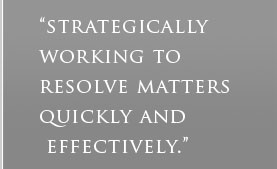CEQA
Is the Great Equalizer
By
Everett DeLano, November 2, 2015
Our
society is made up of “haves” and “have-nots.”
The
disparity is glaringly evident in the legal
profession. Just
ask ordinary people about how much they
incurred in fees and costs when they needed to hire
a lawyer. Like
other aspects of life, the wealthy can and
do use the legal system to their advantage. Wealthy
people sue not-so-wealthy people and large companies
sue small companies, knowing full well that
their resources give them an advantage in
a system that requires you to pay to play.
It's
with this recognition that I have to wonder about
what I see as a steady stream of complaints about
CEQA abuse.
First off, let's be clear about one thing:
I don't think most people making these complaints
are really concerned about the effects of CEQA itself.
It isn't like “elder
abuse” or “spousal abuse” – the people complaining are
normally trying to reduce CEQA's
reach (if not gut it entirely). In other
words, the ones complaining don't seem to
have CEQA's health on their agenda.
The
complainers challenge the motives of those
who file CEQA cases, claiming some are merely motivated
by money or other non-environmental concerns. It's
as if there's some altruism requirement
to filing a CEQA case. But who's to decide
what motivations are altruistic enough?
I
once represented some folks affiliated
with a small business who were concerned that a competitor
had received approvals without the same
type of air and water quality controls they had to
install. My clients saw the
issue as one of basic fairness; are we to say their
concerns were not sufficiently “environmental” in nature
and therefore no suit should be possible?
The
complainers also critique the high cost
of CEQA compliance. This critique is particularly rich. I
have seen several authors of environmental documents
bend over backward to try to avoid stating the obvious – that
whether or not the project is a good idea,
it's going to exact a high toll on the environment.
CEQA
is an environmental disclosure statute. It
is refreshing when a CEQA document actually
acknowledges the impacts of a project,
and it takes far fewer pages (and less consultant
costs) to describe the impact and appropriate mitigation
than it does to contort like a pretzel to avoid admitting
these impacts.
Frankly,
I don't think the complainers are worried
about CEQA abuse at all. I think they don't like
the fact that CEQA turns the normal system on its head – not-so-wealthy
people and nonprofit groups can sue agencies
and wealthy companies to ensure that the
conversation about a project is a little more honest.
In
that sense, CEQA allows ordinary folks
(often branded by the PR firms of those wealthy companies
as “NIMBYs”)
to fight City Hall. And perhaps that's what has
these complainers really up in arms – how dare the “have-nots” actually
challenge the “haves”!
top
|











